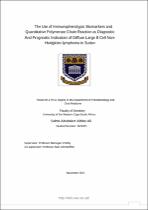| dc.contributor.advisor | Chetty, Manogari | |
| dc.contributor.author | Ali, Salma Abubaker Abbas | |
| dc.date.accessioned | 2022-03-24T07:43:01Z | |
| dc.date.available | 2022-03-24T07:43:01Z | |
| dc.date.issued | 2021 | |
| dc.identifier.uri | http://hdl.handle.net/11394/8972 | |
| dc.description | Philosophiae Doctor - PhD | en_US |
| dc.description.abstract | The incidence of Diffuse large B cell Lymphoma has been increasing lately at an alarming rate especially, in developing countries like Sudan. The standard therapy in Sudan is based solely on the R-CHOP chemotherapy regimen, yet it has been noticed that Diffuse Large B cell Lymphoma prognosis remains unfavorable. The late diagnosis and the consequent side-effects of the therapy directly affected the disease’s poor outcome. There is a scarcity of scientific publications regarding DLBCL in Sudan, but the increased burden necessitates the need for further research. | en_US |
| dc.language.iso | en | en_US |
| dc.publisher | University of Western Cape | en_US |
| dc.subject | Immunophenotypic biomarkers | en_US |
| dc.subject | Diffuse large B cell lymphoma | en_US |
| dc.subject | Sudan | en_US |
| dc.subject | Tumor | en_US |
| dc.subject | World Health Organisation (WHO) | en_US |
| dc.title | The use of immunophenotypic biomarkers and quantitative polymerase chain reaction as diagnostic and prognostic indicators of diffuse large b cell non-hodgkins lymphoma in Sudan | en_US |
| dc.rights.holder | University of Western Cape | en_US |

